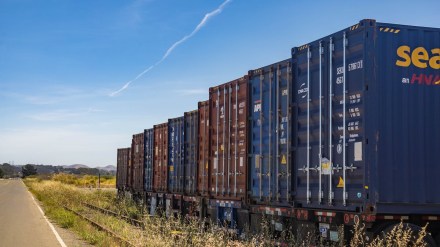– By Raju Sinha
As we celebrate National Logistics Day 2024, it’s important to recognize how advanced logistics and e-commerce are transforming India. The logistics sector, often seen as the backbone of the economy, has undergone significant changes in recent years. These changes are driven by technology and the rise of e-commerce, and they are crucial to building a new Bharat.
The E-commerce Boom and Its Impact on Logistics:
E-commerce in India has grown rapidly due to increasing internet penetration, a growing middle class, and changing shopping habits. This growth demands a robust and efficient logistics system to ensure the seamless movement of goods across the country. Customers now expect faster deliveries, real-time tracking, and efficient last-mile delivery, making the role of logistics more critical than ever. The exponential growth of e-commerce has put immense pressure on the logistics sector to innovate and adapt. Advanced logistics solutions are now essential to meet the demands of modern consumers.
Technological Innovations Driving Logistics:
1. Artificial Intelligence and Machine Learning: AI and ML algorithms are revolutionizing logistics operations. These technologies assist in demand forecasting, cost optimization, and predictive maintenance. By analyzing large datasets, logistics systems can predict potential disruptions, suggest best routes/logistics providers to be used, and ensure timely deliveries. This level of efficiency is crucial for handling the high volume of orders generated by the e-commerce boom.
2. Automation and Robotics: Automation is transforming the logistics sector by reducing human intervention, minimizing errors, and speeding up processes. Automated sorting systems, robotic process automation (RPA), and drone deliveries are examples of how technology is enhancing logistics operations. Automated warehousing solutions ensure that goods are picked, packed, and shipped with unparalleled accuracy and speed, meeting the high expectations of e-commerce customers.
3. Advanced Tracking System with Estimated Delivery Date: Transparency and predictability are crucial in logistics. Advanced tracking system offers real-time updates and provides customers with an estimated delivery date. This system not only keeps customers informed but also helps businesses manage expectations and plan better. By integrating predictive analytics, one can anticipate potential delays and proactively communicate with customers, further enhancing their experience.
4. Hyperlocal Delivery Models: Partnering with local delivery service providers ensures faster and more efficient deliveries within cities. This model not only reduces delivery times but also supports local economies by involving local businesses in the logistics process.
5. Advanced Address Systems: Accurate addressing is crucial for successful deliveries. Advanced address verification systems use geolocation data to ensure precise delivery locations, reducing failed delivery attempts and enhancing customer satisfaction. This technology is especially important in densely populated urban areas where traditional addressing systems may be inadequate.
Sustainable Logistics
As we build a new Bharat, sustainability is a key consideration. The logistics sector, traditionally a significant contributor to carbon emissions, is undergoing a green transformation. Several initiatives are being implemented to reduce the environmental impact of logistics operations:
1. Electric Vehicles (EVs): The integration of electric vehicles into delivery fleets is reducing reliance on fossil fuels and minimizing emissions. EVs are becoming an essential part of sustainable logistics, contributing to cleaner and greener urban environments.
2. Eco-friendly Packaging: The use of sustainable packaging materials that are biodegradable and recyclable is being encouraged to reduce environmental impact. Eco-friendly packaging solutions not only reduce waste but also appeal to environmentally conscious consumers.
3. Optimized Delivery Routes: AI-driven route optimization enhances delivery efficiency while reducing fuel consumption and emissions. By finding the most efficient routes, logistics companies can minimize their carbon footprint and contribute to a more sustainable logistics ecosystem.
The Role of Advanced Logistics Solutions in Building a New Bharat
The logistics sector is not just about moving goods from one place to another; it is about creating a seamless and efficient system that supports the entire economy. Advanced logistics solutions are at the heart of this transformation, enabling businesses to operate more efficiently and meet the demands of modern consumers.
For instance, logistics companies that specialize in e-commerce are developing innovative solutions to address the unique challenges of online retail. Moreover, the integration of sustainable practices into logistics operations is essential for building a new Bharat. By adopting electric vehicles, promoting eco-friendly packaging, and optimizing delivery routes, logistics companies are contributing to a greener and more sustainable future. These initiatives not only reduce the environmental impact of logistics operations but also set a positive example for other industries to follow.
Summing Up
National Logistics Day 2024 is a testament to the critical role that advanced logistics and e-commerce play in shaping the future of India. Companies are driving this transformation, leveraging cutting-edge technologies to build a more efficient, transparent, and sustainable logistics ecosystem. As the industry continues to innovate and adapt, the dream of a new Bharat, characterized by seamless and efficient logistics, is becoming a reality.
(Raju Sinha is the Chief Business Officer of Fship.)
(Disclaimer: Views expressed are personal and do not reflect the official position or policy of Financial Express Online. Reproducing this content without permission is prohibited.)
